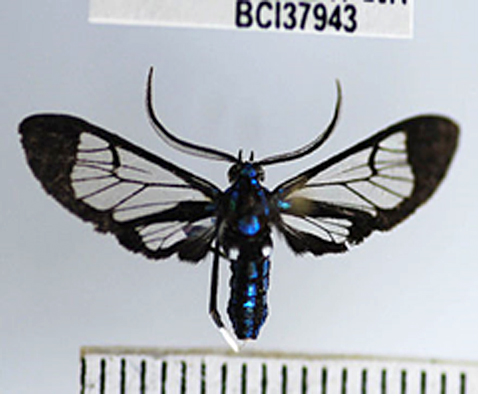Tiger Moth Found in Colombian Apple Bananas
PHILADELPHIA — The U.S. Department of Agriculture (USDA) recently confirmed the tiger moth that U.S. Customs and Border Protection (CBP) agriculture specialists intercepted in a shipment of Colombian apple bananas at the Philadelphia seaport is the nation’s first recorded find of this species.
CBP agriculture specialists discovered the insect specimen on August 8 during a routine produce container inspection and submitted the pest to the local USDA entomologist for identification. The following day, the entomologist determined the specimen to be Cosmosoma ruatana (Erebidae) with an additional comment that this specimen is a new pest. On September 9, the USDA national pest identification database confirmed the specimen as the first reported discovery of Cosmosoma ruatana (Erebidae) in the United States.

the first Cosmosoma ruatana, or tiger moth, ever
reported in the U.S.
Insects belonging to the family Erebidae, or tiger moths, are considered polyphagous, which makes them potential pests of concern to many different agriculture crops.
“Intercepting destructive insect invaders at our nation’s borders, before they can threaten our agriculture industries, is of great importance to Customs and Border Protection,” said Margaret Braunstein, Acting CBP Area Port Director for the Port of Philadelphia. “CBP agriculture specialists take their job very seriously, and this ‘First-in-Nation’ insect interception is a significant discovery.”
CBP agriculture specialists have extensive training and experience in the biological sciences, risk analysis, and imported agriculture inspection techniques. CBP agriculture specialists are the first line of defense in the protection of U.S. agriculture, forest, and livestock industries from exotic destructive plant pests and animal diseases.
On a typical day nationally, CBP agriculture specialists inspect over one million people as well as cargo arriving by air and sea to the United States. They also intercept approximately 4,548 prohibited meat, plant materials, or animal products, and discover over 470 agriculture pests and diseases that could have detrimental effects to our nation’s agriculture resources, food production, and animal and human health. To read more about the CBP agriculture mission click CBP Agriculture.
CBP routinely conducts inspection operations on arriving and departing international flights and intercepts narcotics, weapons, unreported currency, prohibited agriculture products, and other illicit items. To read more about CBP click CBP Snapshot.

